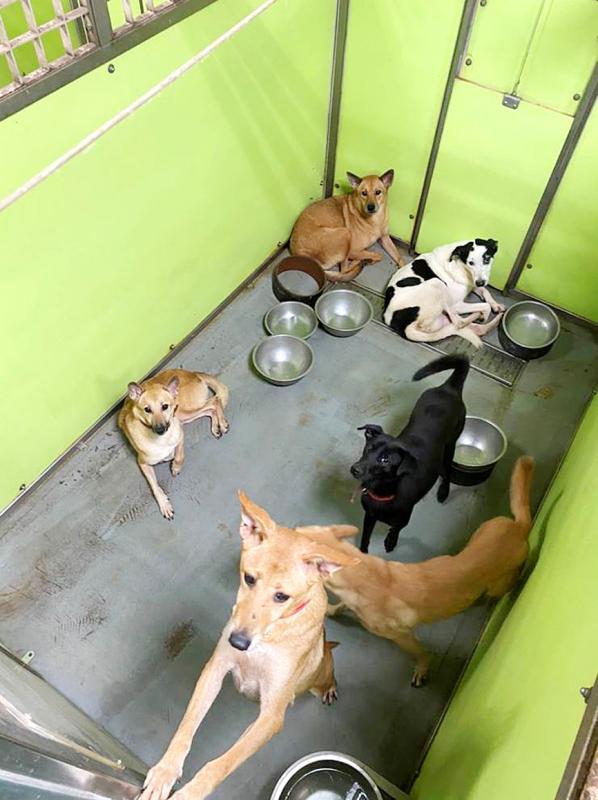The number of strays dying in Taipei’s animal shelters has increased over the past two years, despite a ban on euthanasia, said a source on Sunday, who called on Taipei Mayor Ko Wen-je (柯文哲) to address the situation.
Last year, deaths among stray animals in shelters reached a four-year high of 6.01 percent and as of October the figure was 4.38 percent, the source said.
Taipei Deputy Mayor Vivian Huang (黃珊珊) said that the deaths were partially attributable to aging.

Photo courtesy of Taipei City Councilor Yang Ching-yu
The city has added adoption relay stations and has planned renovations at existing stations, Huang said, adding that the facilities would be doubled in size.
The city since 2019 has planned to renovate its main animal shelter, the Taipei Animal Protection Office, on Tanmei Street in Neihu District (內湖) and build a new 3,400 ping (11,240m2) facility, the source said.
However, due to Ko’s concern that the NT$700 million (US$25.18 million) required to build the new facility — as well as NT$200 million for waste management — was too expensive, the plans have stalled, the source said.
“Because Ko has shifted back and forth on his animal shelter policy, city shelters are getting crowded, creating a bad environment for the animals,” the source said. “Last year more than 200 strays died in the city’s shelters.”
The animal euthanasia ban went into effect in 2017 and the following year the number of strays that died in shelters increased by 3.91 percent, the source said, adding that the proportion has been increasing each year since then.
“The number of strays at the Tanmei facility is already double its intended capacity,” Taipei City Councilor Yang Ching-yu (楊靜宇) said. “Five to seven dogs share each pen.”
“There are also multiple cats in each cage lining the hallways,” Yang said.
Yang, who is a trained vet, said that the animals would be distressed, fearing that they would need to compete for food.
The situation would worsen if the city does not expand the facilities, he said.
At least 2,900 ping is needed, he said, adding that the city should build a multifunction facility where animals could be trained and the public could be educated about pet adoption.
Taiwan Animal Protection Monitor Network secretary-general Ho Tsung-hsun (何宗勳) said that Taipei should follow the lead of other cities, such as Tainan, which neuters strays and promotes pet adoption, and New Taipei City, which trains strays as working dogs.
“Taipei has the most resources, so it should find opportunities to help promote proper care of animals,” Ho said.
Promoting adoption through the Taipei City Animal Protection Office alone would be ineffective, he said, adding that Ko should find better solutions to boost adoption rates.

Taiwanese can file complaints with the Tourism Administration to report travel agencies if their activities caused termination of a person’s citizenship, Mainland Affairs Council Minister Chiu Chui-cheng (邱垂正) said yesterday, after a podcaster highlighted a case in which a person’s citizenship was canceled for receiving a single-use Chinese passport to enter Russia. The council is aware of incidents in which people who signed up through Chinese travel agencies for tours of Russia were told they could obtain Russian visas and fast-track border clearance, Chiu told reporters on the sidelines of an event in Taipei. However, the travel agencies actually applied

Japanese footwear brand Onitsuka Tiger today issued a public apology and said it has suspended an employee amid allegations that the staff member discriminated against a Vietnamese customer at its Taipei 101 store. Posting on the social media platform Threads yesterday, a user said that an employee at the store said that “those shoes are very expensive” when her friend, who is a migrant worker from Vietnam, asked for assistance. The employee then ignored her until she asked again, to which she replied: "We don't have a size 37." The post had amassed nearly 26,000 likes and 916 comments as of this

New measures aimed at making Taiwan more attractive to foreign professionals came into effect this month, the National Development Council said yesterday. Among the changes, international students at Taiwanese universities would be able to work in Taiwan without a work permit in the two years after they graduate, explainer materials provided by the council said. In addition, foreign nationals who graduated from one of the world’s top 200 universities within the past five years can also apply for a two-year open work permit. Previously, those graduates would have needed to apply for a work permit using point-based criteria or have a Taiwanese company

The Shilin District Prosecutors’ Office yesterday indicted two Taiwanese and issued a wanted notice for Pete Liu (劉作虎), founder of Shenzhen-based smartphone manufacturer OnePlus Technology Co (萬普拉斯科技), for allegedly contravening the Act Governing Relations Between the People of the Taiwan Area and the Mainland Area (臺灣地區與大陸地區人民關係條例) by poaching 70 engineers in Taiwan. Liu allegedly traveled to Taiwan at the end of 2014 and met with a Taiwanese man surnamed Lin (林) to discuss establishing a mobile software research and development (R&D) team in Taiwan, prosecutors said. Without approval from the government, Lin, following Liu’s instructions, recruited more than 70 software